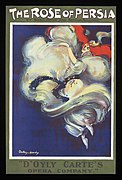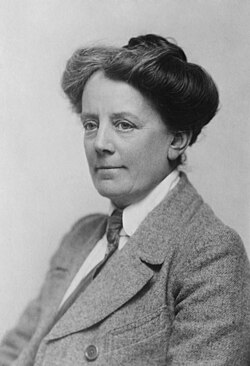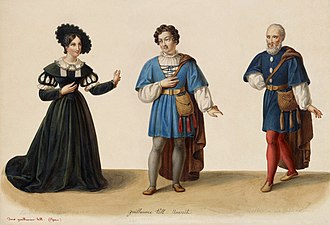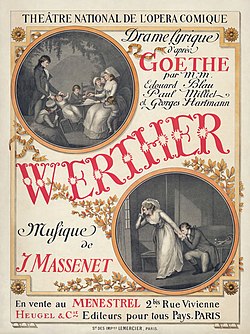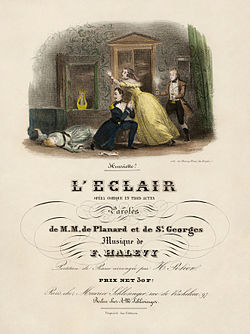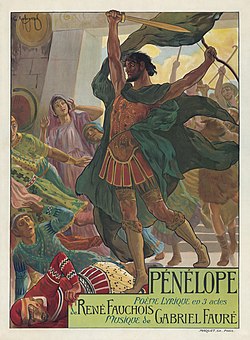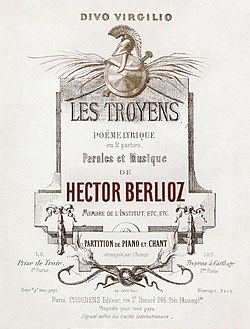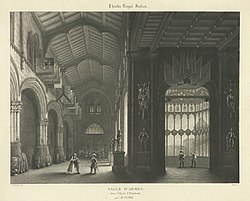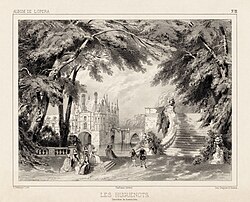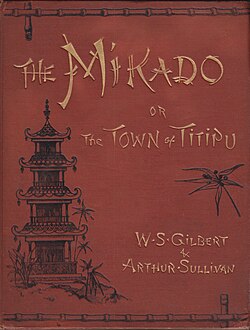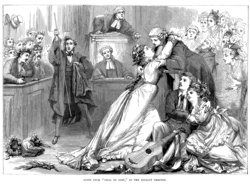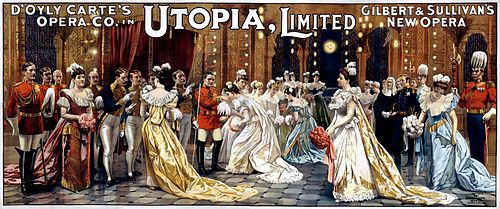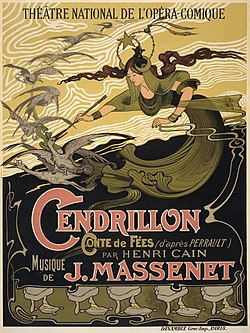Portal:Opera
The Opera Portal
Opera is an art form in which singers and musicians perform a dramatic work (called an opera) which combines a text (called a libretto) and a musical score. Opera is part of the Western classical music tradition. Opera incorporates many of the elements of spoken theatre, such as acting, scenery and costumes and sometimes includes dance. The performance is typically given in an opera house, accompanied by an orchestra or smaller musical ensemble.
Opera started in Italy at the end of the 16th century (with Jacopo Peri's lost Dafne, produced in Florence around 1597), and was championed by Claudio Monteverdi with works such as L'Orfeo. It soon spread through the rest of Europe: Schütz in Germany, Lully in France, and Purcell in England all helped to establish their national traditions in the 17th century. However, in the 18th century, Italian opera continued to dominate most of Europe, except France, attracting foreign composers such as Handel. Opera seria was the most prestigious form of Italian opera, until Gluck reacted against its artificiality with his "reform" operas in the 1760s. Today the most renowned figure of late 18th century opera is Mozart, who began with opera seria but is most famous for his Italian comic operas, especially The Marriage of Figaro, Don Giovanni, and Così fan tutte, as well as The Magic Flute, a landmark in the German tradition.
The first third of the 19th century saw the highpoint of the bel canto style, with Rossini, Donizetti and Bellini all creating works that are still performed today. It also saw the advent of Grand Opera typified by the works of Meyerbeer. The mid to late 19th century is considered by some a golden age of opera, led by Wagner in Germany and Verdi in Italy. This 'golden age' developed through the verismo era in Italy and contemporary French opera through to Puccini and Strauss in the early 20th century. During the 19th century, parallel operatic traditions emerged in Central and Eastern Europe, particularly in Russia and Bohemia. The 20th century saw many experiments with modern styles, such as atonality and serialism (Schoenberg and Berg), Neo-Classicism (Stravinsky), and Minimalism (Philip Glass and John Adams). With the rise of recording technology, singers such as Enrico Caruso became known to audiences beyond the circle of opera fans. Operas were also performed on (and written for) radio and television.
| More about Opera... |
Selected article
Featured picture
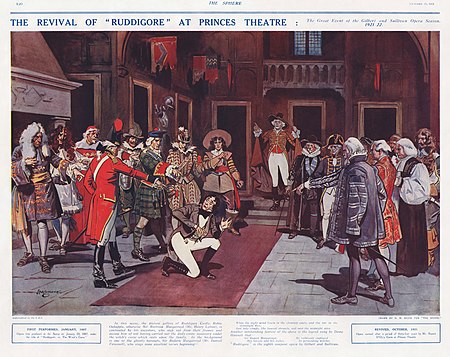
The first night was not altogether a success, as critics and the audience felt that Ruddygore (as it was originally spelled) did not measure up to its predecessor, The Mikado. After some changes, including respelling the title, it achieved a run of 288 performances. The Illustrated London News praised the work of both Gilbert and, especially, Sullivan: "Sir Arthur Sullivan has eminently succeeded alike in the expression of refined sentiment and comic humour. In the former respect, the charm of graceful melody prevails; while, in the latter, the music of the most grotesque situations is redolent of fun."
There were further changes and cuts, including a new overture, when Rupert D'Oyly Carte revived Ruddigore for the first time since its original run for a 1920 tour that turned into a London run in 1921 (pictured here). This caused the opera to enter the repertory, which it has never left since.In this month
- 1 March 2010 – Kaija Saariaho's opera Émilie premiered at the Opéra de Lyon with Karita Mattila, in the title role.
- 2 March 1961 – Simone Young (pictured), the first woman to conduct at the Vienna State Opera, was born in Sydney, Australia.
- 3 March 1875 - Georges Bizet's Carmen had its world premiere at the Opéra-Comique in Paris.
- 6 March 1853 – Fanny Salvini-Donatelli starred in the world premiere of Verdi's La traviata.
- 16 March 1894 – Sibyl Sanderson sang the title role in the world premiere of Massenet's Thaïs.
- 17 March 1665 – Élisabeth Jacquet was born in Paris. Her Céphale et Procris was the first opera by a woman composer to be performed at the Paris Opera.
- 20 March 1952 – Birgitta Svendén, mezzo-soprano and General Manager of the Royal Swedish Opera, was born in Porjus, Sweden.
- 23 March 2006 – Sarah Caldwell, American opera conductor, impresario, and stage director, died in Portland, Maine.
- 28 March 1911 – Myfanwy Piper, the librettist of Benjamin Britten's operas The Turn of the Screw, Owen Wingrave, and Death in Venice, was born in London.
Selected biography
Selected quote
Selected audio
From Giuseppe Verdi's Un ballo in maschera, sung by Enrico Caruso, Frieda Hempel, Maria Duchêne, Andrés de Segurola and Léon Rothier (1914)
Did you know?
- ...that Alma Webster Powell (pictured) earned a law degree from New York University while on a break from her operatic career?
- ...that the Austrian actor and librettist Karl Lindau co-wrote The Nazi, a comedy, in 1895?
- ...that Johannes Brahms attended the premiere of the operetta Die Göttin der Vernunft by Johann Strauss, but the composer himself did not, and heard about its reception only by telephone?
Related portals
WikiProjects
- Parent projects
WikiProject Arts • WikiProject Music • WikiProject Theatre
- Main project
- Descendant projects
WikiProject Richard Wagner • WikiProject Gilbert and Sullivan
- Similar projects
WikiProject Classical music • WikiProject Composers
What are WikiProjects?
Main topics
Opera history: Origins of opera • Italian opera • Opera in German • French opera • Opera in English • Polish opera • Russian opera • Hungarian opera • Armenian opera • Opera in Latin America
Opera genres: Azione teatrale · Ballad opera · Comédie en vaudevilles · Comédie mêlée d'ariettes · Dramma giocoso · Dramma per musica · Farsa · Festa teatrale · Género chico · Grand Opera · Music Drama · Opéra-ballet · Opera buffa · Opéra bouffe · Opéra bouffon · Opéra comique · Opéra féerie · Opera semiseria · Opera seria · Operetta · Pastorale héroïque · Romantische Oper · Savoy opera · Semi-opera · Singspiel · Spieloper · Tragédie en musique · Verismo · Zarzuela · Zeitoper
Opera terms: Aria · Aria di sorbetto · Arioso · Bel canto · Breeches role · Burletta · Cabaletta · Cadenza · Cantabile · Castrato · Cavatina · Chest voice · Claque · Coloratura · Comprimario · Convenienze · Coup de glotte · Da capo aria · Diva · Entr'acte · Fach · Falsetto · Fioritura · Gesamtkunstwerk · Head voice · Intermezzo · Kammersänger · Leitmotif · Legato · Libretto · Literaturoper · Mad scene · Maestro · Melodrama · Melodramma · Monodrama · Messa di voce · Opera house · Passaggio · Portamento · Prima donna · Prompter · Recitative · Regietheater · Répétiteur · Sitzprobe · Spinto · Sprechgesang · Squillo · Stagione · Surtitles · Tessitura · Timbre · Vibrato
Opera voices: Baritenor · Baritone · Bass · Bass-baritone · Coloratura soprano · Contralto · Countertenor · Dramatic soprano · Haute-contre · Lyric soprano · Mezzo-soprano · Soprano · Soubrette · Spinto soprano · Tenor · Tenore contraltino · Tenore di grazia
Opera lists: Opera topics • List of operas by composer • Important operas • Major opera composers • Opera librettists • Opera houses • Opera companies • Opera festivals • Opera directors • Operetta composers • Orphean operas • Zarzuela composers • Opera genres • Operas set in the Crusades • The Record of Singing • Bayreuth canon
Featured content
Featured articles
 Agrippina (opera)
Agrippina (opera) L'Ange de Nisida
L'Ange de Nisida L'Arianna
L'Arianna The Bartered Bride
The Bartered Bride Georges Bizet
Georges Bizet Benjamin Britten
Benjamin Britten Alan Bush
Alan Bush Carmen
Carmen English National Opera
English National Opera Falstaff (opera)
Falstaff (opera) Kathleen Ferrier
Kathleen Ferrier Gianni Schicchi
Gianni Schicchi Handel's lost Hamburg operas
Handel's lost Hamburg operas His Majesty's Theatre, London
His Majesty's Theatre, London L'incoronazione di Poppea
L'incoronazione di Poppea Lost operas by Claudio Monteverdi
Lost operas by Claudio Monteverdi Jules Massenet
Jules Massenet Felix Mendelssohn
Felix Mendelssohn André Messager
André Messager Claudio Monteverdi
Claudio Monteverdi Carl Nielsen
Carl Nielsen Nixon in China
Nixon in China Noye's Fludde
Noye's Fludde Jacques Offenbach
Jacques Offenbach L'Orfeo
L'Orfeo Orpheus in the Underworld
Orpheus in the Underworld Les pêcheurs de perles
Les pêcheurs de perles Maurice Ravel
Maurice Ravel Rhinemaidens
Rhinemaidens Nikolai Rimsky-Korsakov
Nikolai Rimsky-Korsakov Rinaldo (opera)
Rinaldo (opera) Il ritorno d'Ulisse in patria
Il ritorno d'Ulisse in patria Gioachino Rossini
Gioachino Rossini The Royal Opera
The Royal Opera Bedřich Smetana
Bedřich Smetana Charles Villiers Stanford
Charles Villiers Stanford Pyotr Ilyich Tchaikovsky
Pyotr Ilyich Tchaikovsky Michael Tippett
Michael Tippett Tosca
Tosca Richard Wagner
Richard Wagner
Featured lists
Good articles
 Marian Anderson
Marian Anderson W. H. Auden
W. H. Auden Maxim Berezovsky
Maxim Berezovsky Helena Braun
Helena Braun Ferruccio Busoni
Ferruccio Busoni Richard D'Oyly Carte
Richard D'Oyly Carte The Castafiore Emerald
The Castafiore Emerald Soňa Červená
Soňa Červená Patrice Chéreau
Patrice Chéreau Erik Chisholm
Erik Chisholm Graham Clark (tenor)
Graham Clark (tenor) Ryland Davies
Ryland Davies Doctor Ox's Experiment (opera)
Doctor Ox's Experiment (opera) John Thomas Douglass
John Thomas Douglass Ernest II, Duke of Saxe-Coburg and Gotha
Ernest II, Duke of Saxe-Coburg and Gotha The Fairy-Queen
The Fairy-Queen Fatinitza
Fatinitza Fire Shut Up in My Bones
Fire Shut Up in My Bones Mirella Freni
Mirella Freni Éva Gauthier
Éva Gauthier Johanna Geisler
Johanna Geisler Alexander Goehr
Alexander Goehr Stephen Gould (tenor)
Stephen Gould (tenor) Grant Park Music Festival
Grant Park Music Festival Grounded (opera)
Grounded (opera) Edita Gruberová
Edita Gruberová Robert Hale (bass-baritone)
Robert Hale (bass-baritone) Cecelia Hall (mezzo-soprano)
Cecelia Hall (mezzo-soprano) Julius Harrison
Julius Harrison Magdalena Hinterdobler
Magdalena Hinterdobler Leoš Janáček
Leoš Janáček Enriqueta Legorreta
Enriqueta Legorreta Berit Lindholm
Berit Lindholm The Maiden in the Tower
The Maiden in the Tower Giacomo Meyerbeer
Giacomo Meyerbeer Beatriz Michelena
Beatriz Michelena Tamara Milashkina
Tamara Milashkina Nabucco
Nabucco Nausicaa (opera)
Nausicaa (opera) Jessye Norman
Jessye Norman Opera in Ukraine
Opera in Ukraine Orfeo ed Euridice
Orfeo ed Euridice Antonio Paoli
Antonio Paoli Sergei Prokofiev
Sergei Prokofiev Maria Radner
Maria Radner Robert le diable
Robert le diable Gabriele Schnaut
Gabriele Schnaut Franz Schubert
Franz Schubert Johann Strauss II
Johann Strauss II Twice Through the Heart
Twice Through the Heart Va tacito e nascosto
Va tacito e nascosto Giuseppe Verdi
Giuseppe Verdi Claude Vivier
Claude Vivier Wales Millennium Centre
Wales Millennium Centre Welsh National Opera
Welsh National Opera Portia White
Portia White Steuart Wilson
Steuart Wilson Rachel Yakar
Rachel Yakar
Featured pictures
- 1899 poster of Mme. M. Sissieretta Jones
- Adolphe-Joseph-Louis Alizard from Le Charivari
- Advertisement for the music score of La Bohème, 1895
- Aida poster colors fixed
- Al quartiere latino, bozzetto di Adolf Hohenstein per La Bohème (1896) - Archivio Storico Ricordi ICON000086 - Restoration
- Albert Pierre-René Maignan - Jules Massenet - Ariane
- Albert Reiss LOC ggbain-25651
- Alexandre Charles Lecocq - Giuseppe Verdi - La forza del destino
- Alexandre Fragonard - Scène de L'orage (Barbier de Séville)
- Alexandre Lacauchie - Gilbert Duprez as Gaston in Verdi's Jérusalem
- Alfredo Edel - Jules Massenet - Le mage
- Alice Neilsen's production of Victor Herbert's The Fortune Teller
- Amilcare Ponchielli (before 1886) - Archivio Storico Ricordi FOTO000794 - Restoration
- Amédée Forestier - Illustrated London News - Gilbert and Sullivan - Ruddygore (Ruddigore)
- Anna Fernqvist, rollporträtt - SMV - H1 122 - Restoration
- Atelier Nadar - Fly scene from Offenbach's Orphée aux enfers with Jeanne Granier as Eurydice and Eugène Vauthier as Jupiter, 1887 revival, wide-angle shot
- Atelier Nadar - Galli-Marié in Bizet's Carmen
- Atelier Nadar - Jacques Isnardon, Vaudeville
- Auguste François-Marie Gorguet - poster for the première performance of Édouard Lalo's Le roi d'Ys (1888)
- Barbier, Jules, Nadar, Gallica
- Blanche Roosevelt by Napoleon Sarony
- Boris Kustodiev - Portrait of Fyodor Chaliapin - Google Art Project
- Carl Nielsen c. 1908 - Restoration
- Carloz Schwabe - Vincent d'Indy's Fervaal
- Cavalleria Rusticana - Alfio and Turiddu embrace
- Cavalleria Rusticana - Santuzza and Turiddu outside the church
- Charles Gounod (1890) by Nadar
- Charles Motte - Rossini et Georges IV - la soirée de Brighton
- Charles-Antoine Cambon - La Esmeralda, Act 3, Scene 2 set
- Charles-Antoine Cambon - La Esmeralda, Act III, Scene 1 set design (Version 2)
- Charles-Antoine Cambon - Set design for Act V, Scene 2 of Fromental Halévy's La reine de Chypre
- Charles-Antoine Cambon - Set design for the première of Rossini's Robert Bruce, Act III, Scene 3
- Cherubini, Luigi - Medea - Restoration
- Christine Nilsson Nadar
- Colette and Maurice Ravel's L'enfant et les sortilèges, 1st scene
- Colette and Maurice Ravel's L'enfant et les sortilèges, 2nd scene
- Collina presso Nagasaki, bozzetto di Alexandre Bailly, Marcel Jambon per Madama Butterfly (1906) - Archivio Storico Ricordi ICON000079 - Restoration
- Composer Rossini G 1865 by Carjat - Restoration
- Cover to Doris Waltz by P. Bucalossi after Alfred Cellier - Art by Nicholas Hanhart
- Célestin Nanteuil - Jules Massenet - Don César de Bazan
- Dudley Hardy - Poster for Basil Hood and Arthur Sullivan's The Rose of Persia
- Dudley Hardy - Poster for His Majesty
- Edmond Cavé 1844 Ingres - NY Met Museum of Art
- Elliott & Fry - photograph W. S. Gilbert
- Ethel Smyth
- Eugène Du Faget - Costume designs for Guillaume Tell - 1-3. Laure Cinti-Damoreau as Mathilde, Adolphe Nourrit as Arnold Melchtal, and Nicolas Levasseur as Walter Furst
- Eugène Du Faget - Costume designs for Les Huguenots - 2. Julie Dorus-Gras as Marguerite, Adolphe Nourrit as Raoul, and Cornélie Falcon as Valentine
- Eugène Grasset - Jules Massenet - Werther
- Falka - Weir Collection
- Falstaff 3
- Fausta Labia, porträtt - SMV - H5 028 - Restoration
- François-Joseph Bélanger - Set design for Gluck's Alceste
- Fromental Halévy, L'Éclair score cover - Restoration
- Georges Rochegrosse - Henry Février - Henri Cain and Louis Payen after Victorien Sardou - Gismonda
- Georges Rochegrosse - Jules Massenet - Roma
- Georges Rochegrosse - Poster for Gabriel Fauré's Pénélope (1913)
- Georges Rochegrosse - Poster for the prèmiere of Claude Debussy and Maurice Maeterlinck's Pelléas et Mélisande
- Georges Rochegrosse's poster for Jules Massenet's Don Quichotte
- Geraldine Ulmar in Gilbert and Sullivan's The Mikado - photograph only
- Giacomo Puccini (1924) - Archivio Storico Ricordi FOTO003293 - Restoration
- Gilbert Duprez & Rosine Stoltz in Donizetti's La Favorite
- Giuseppe Barberis - Carlo Cornaglia - Giuseppe Verdi's Don Carlo at La Scala
- Giuseppe Verdi, Giovanna d'Arco, Vocal Score - Restoration
- Giuseppe Verdi, La traviata title page - Restoration
- Giuseppe Verdi, Lombardi alla prima crociata. Libretto, 1843 - Restoration
- Giuseppe Verdi, Rigoletto, Vocal score illustration by Roberto Focosi - Restoration
- Giuseppe Verdi, Simon Boccanegra first edition libretto for the 1881 revision of the opera - Restoration
- Giuseppe Verdi, Un Ballo in maschera, Vocal score frontispiece - restoration
- H. M. Brock - Gilbert and Sullivan - D'Oyly Carte Opera Company Ruddigore revival 1921
- H. M. Brock - Poster for Iolanthe
- H.J. Whitlock - Photograph of Arthur Sullivan
- H.M.Brock - Poster for Gilbert and Sullivan's The Sorcerer (1919)
- Haydée, ou Le secret Act II - Philippe Chaperon
- Hector Berlioz, Béatrice et Bénédict score title page - Restoration
- Hector Berlioz, La Prise de Troie score cover - Restoration
- Hector Berlioz, Les Troyens vocal score cover - Restoration
- Hector Berlioz, Les Troyens à Carthage vocal score cover - Restoration
- Henri C. R. Presseq - Camille Erlanger - Le juif polonais
- Henry Atwell Thomas - Franz von Suppé - Fatinitza
- Il signor Tambourossini - Delaroche
- Il trovatore by Luigi Morgari
- Illustrated London News - Giuseppe Verdi's Attila at Her Majesty's Theatre, London
- Iolanthe piano transcriptions by Ernst Perabo
- Ivor Novello
- Jacques Offenbach - A. Jannin - Robinson Crusoé
- Jacques Offenbach by Nadar
- Jean de Paleologu - Jules Massenet - Sapho
- Jeremiah Gurney - Photograph of Euphrosyne Parepa-Rosa
- Johann Strauss II by Fritz Luckhardt
- John Phillip Sousa - De Wolf Hopper - El Capitan1
- Joseph Albert - Ludwig und Malwine Schnorr von Carolsfeld - Tristan und Isolde, 1865f
- Jules Massenet - Le Cid 2e Acte, 3e Tableau - L'Illustration
- Jules Massenet - Le Cid 3e Acte, 6e Tableau - L'Illustration
- Jules Massenet by Eugène Pirou
- La Juive Act 1 set 1835 - Restoration
- Le comte Ory - Dubois & chez Martinet - Final scene
- Lilly Walleni in Daria at Kungliga Operan 1907 - SMV - NV059
- Louis Guéymard as Robert le Diable by Gustave Courbet - The Metropolitan Museum of Art 436015 (cropped)
- Lucy Arbell as Queen Amahelli in Massenet's Bacchus, wide view
- Lucy Arbell in Massenet's Thérèse
- Lucy Arbell photographed by Paul Nadar
- Luigi Verardi after Dominico Ferri - Gaetano Donizetti - Carrefour de St Jean et Paul. Dans l'Opéra Marino Faliero
- Luigi Verardi after Dominico Ferri - Vincenzo Bellini - Théatre Royal Italien. Salle d'armes dans l'Opéra I Puritani
- M. Browne - Herbert Railton - Sydney Grundy - Arthur Sullivan - Haddon Hall
- Mademoiselle Maupin de l'Opéra (Julie d'Aubigny)
- Mademoiselle Priola de l'Opéra Comique, rôle de Javotte dans "Le Roi l'a dit" de Delibes
- Magna Lykseth in Tristan och Isolde at Kungliga Operan 1909 - SMV - GL164
- Marcel Jambon - Giuseppe Verdi - Otello Act I set design model
- Maria Carrara Verdi, Barberina Strepponi, Giuseppe Verdi, Giuditta Ricordi, Teresa Stolz, Umberto Campanari, Giulio Ricordi, Leopoldo Metlicovitz (1900) - Archivio storico Ricordi FOTO003107 - Restoration
- Marian Anderson
- Maritana - Nov 22 1845 Illustrated London News
- Max Brückner - Otto Henning - Richard Wagner - Final scene of Götterdämmerung
- Meyerbeer - Les Huguenots - Décor Acte II
- Michael William Balfe - Atelier Nadar
- Napoli, strada Acquaquilia, bozzetto di Riccardo Salvadori per A Basso Porto (1894) - Archivio Storico Ricordi ICON002556
- Nelly Martyl by Jean Reutlinger (Image 10715)
- Paul Maurou - Poster for Edmond Audran's Gillette de Narbonne
- Percy Anderson - Poster for The Duchess of Dantzic
- Philippe Chaperon - Meyerbeer - Les Huguenots Act I (1896)
- Philippe Chaperon - Rigoletto
- Philippe Chaperon - Set design for Act V in the première of Victorin Joncières' Dimitri
- Philippe Chaperon by Atelier Nadar
- Pierre Gaveaux by Edmé Quenedey (1821)
- Pierre-Auguste Lamy (?) - Les contes d'Hoffmann by Jacques Offenbach, Giulietta act
- Pierre-Auguste Lamy (?) - Les contes d'Hoffmann by Jacques Offenbach, Olympia act
- Pierre-Auguste Lamy (?) - Les contes d'Hoffmann by Jacques Offenbach, prologue
- Pierre-Luc-Charles Cicéri - Act III set design for the première production of Daniel Auber's Gustave III
- Pierre-Luc-Charles Cicéri - Eugène Cicéri - Philippe Benoist - Adolphe Jean Baptiste Bayot - Décorations de théâtre, Robert le diable, 3e act
- PikiWiki Israel 13773 AIDA AT MASADA 2011
- Portrait of Madame Dugazon (Louise Rosalie Lefèvre), in the title rôle of Nina (Scene V)
- Poster for Burnand and Sullivan's Cox and Box - Royal Gallery of Illustration
- Poster for Gilbert and Clay's Ages Ago at the Royal Gallery of Illustration
- Poster for Jules Massenet's La Navarraise with Emma Calvé in the rôle of Anita
- Poster for Le pardon de Ploërmel 1859
- Poster for The Lucky Star (1899) by Dudley Hardy
- Prokofieff (i.e. Prokofiev) LCCN2014708419 Crop 2
- Prudent-Louis Leray - Poster for the première of Georges Bizet's Carmen
- Robert Jacob Hamerton - Poster for A Sensation Novel
- Robert Jacob Hamerton - Poster for F. C. Burnand and Arthur Sullivan's The Contrabandista
- Rosa Raisa (1917) - Archivio Storico Ricordi FOTO002701 - Restoration
- Set design by Philippe Chaperon for Act1 sc2 of Aida by Verdi 1871 Cairo - Gallica - Restored
- Set design by Philippe Chaperon for Act4 sc2 of Aida by Verdi 1880 Paris
- Souvenir advertisement for Princess Ida by Alice Havers - Page 1
- Souvenir program for the première production of Gilbert and Sullivan's Patience - Cover
- Strauss, Richard - Ariadne auf Naxos - Restoration
- Tavola 5, bozzetto di Gebrüder Brückner per Tannhäuser (s.d.) - Archivio Storico Ricordi ICON011721 - Restoration, crop
- Teatro Municipal de São Paulo 8
- Teresa Brambilla by Antoine Maurin (1845)
- The Mikado Chappell Vocal Score cover (c.1895)
- Thespis - Illustrated London News Jan 6 1872
- Trial by Jury - Chaos in the Courtroom
- Utopia Limited Poster
- Vasta spianata presso Courtray, bozzetto di Giuseppe Palanti per Edgar (s.d.) - Archivio Storico Ricordi ICON000128 B
- Verdi conducting Aida in Paris 1880 - Gallica - Restoration
- Wally (soprano), figurino di Adolf Hohenstein per La Wally (1892) - Archivio Storico Ricordi ICON004639 - Restoration
- Wilhelm - Costume design for Arac, Gunon, and Scynthius (Princess Ida, 1884)
- Édouard de Reszke by Nadar (BPL Hale Coll)
- Émile Bertrand - Jules Massenet - Cendrillon poster
Featured portals
Featured topics
Categories
Things you can do

|
|
Associated Wikimedia
The following Wikimedia Foundation sister projects provide more on this subject:
 Commons
Commons
Free media repository Wikibooks
Wikibooks
Free textbooks and manuals Wikidata
Wikidata
Free knowledge base Wikinews
Wikinews
Free-content news Wikiquote
Wikiquote
Collection of quotations Wikisource
Wikisource
Free-content library Wikiversity
Wikiversity
Free learning tools Wiktionary
Wiktionary
Dictionary and thesaurus
















































